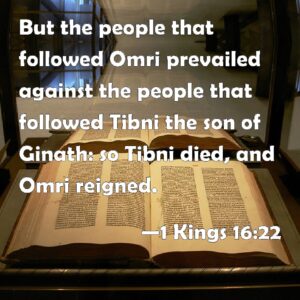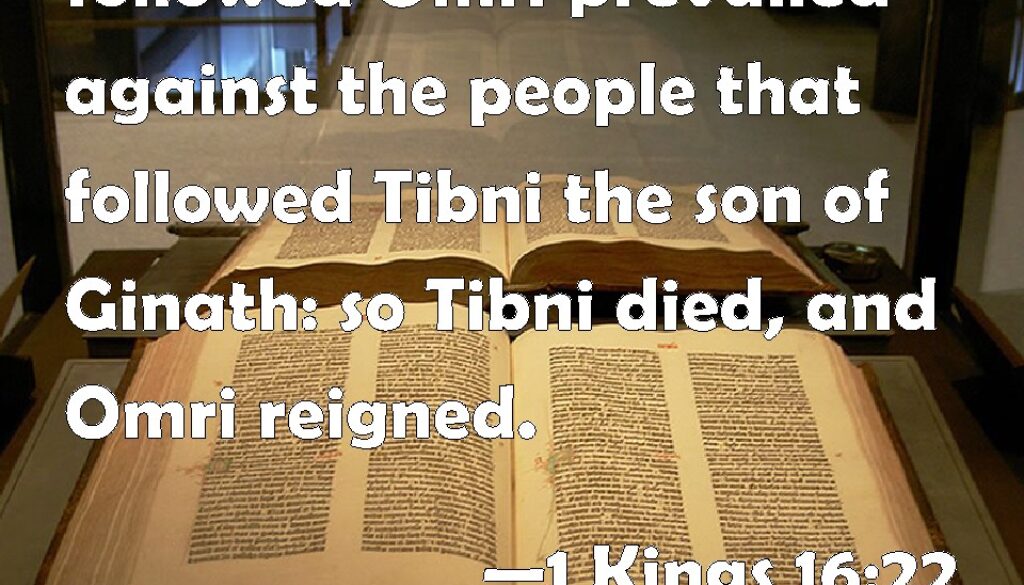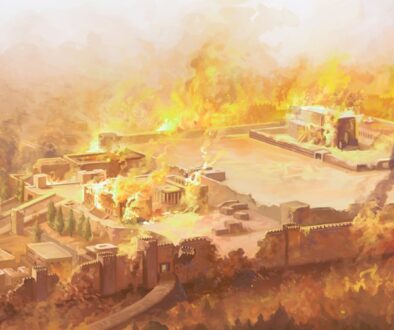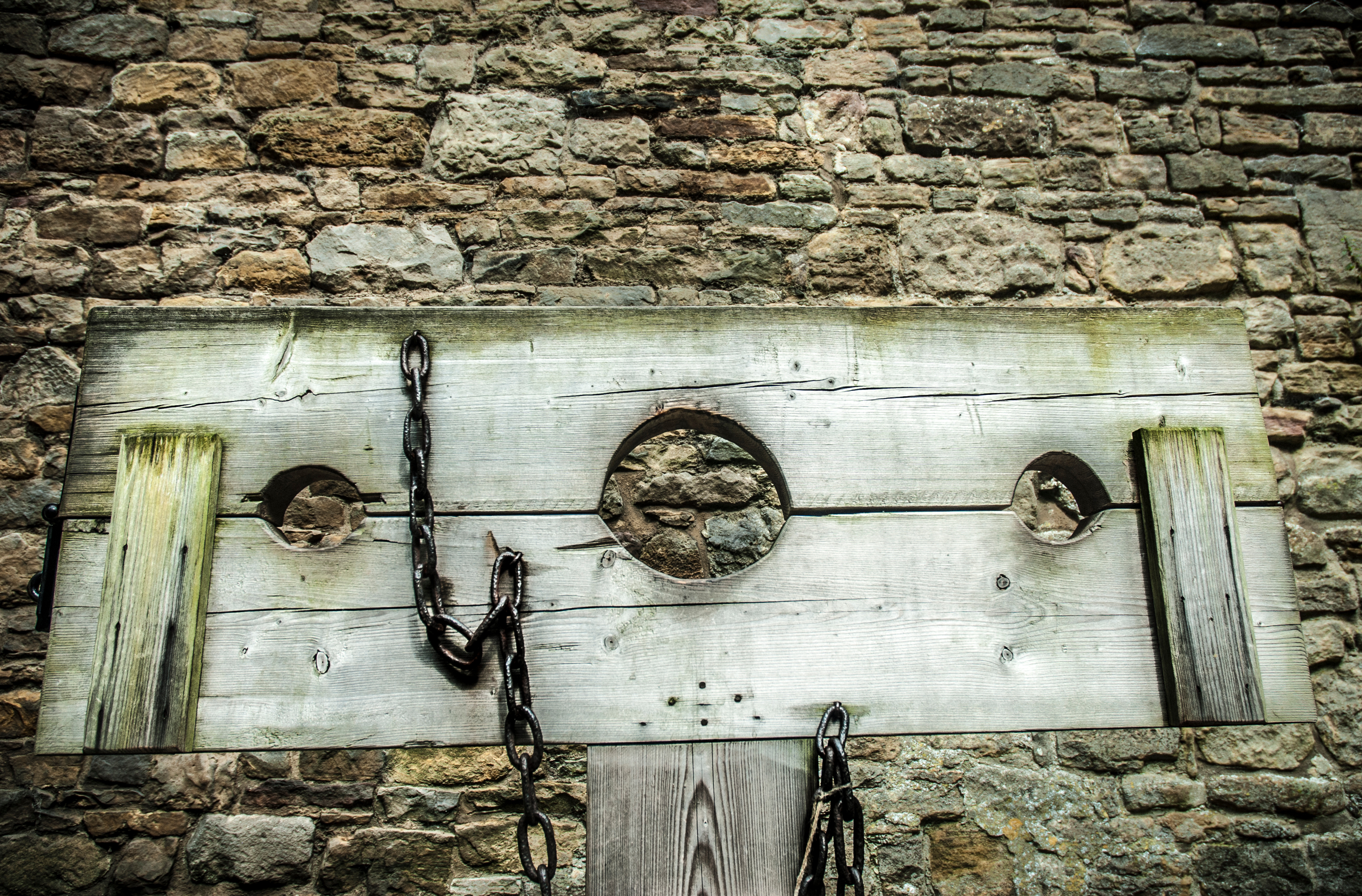1 Kings 16 Omri

We met Omri when Zimri took the throne. Omri was the commander of Israel’s army. Now he becomes Israel’s king, after defeating Tibni.
Omri was proclaimed king on the battle field but he didn’t officially become king. Omri led the troops back to Tirza to deal with Zimri. Zimri burned down the king’s house on top of himself. Now Omri has to face another challenge; Tibni.
We don’t have any information on Tibni, other than his father’s name and that some of the people wanted him to be king instead of Omri. Omri’s people were stronger, so Tibni was no more.
Here again, I wish we had access to the Chronicles of the kings of Israel. We are told that Omri was an evil king, but not given any specifics here. The fact that he was the father of King Ahab, who was the worst of Israel, makes me think that ‘the apple doesn’t fall to far from the tree’. Omri didn’t teach his son to serve the Lord. Nor did he lead the people back to the Lord. Those were certainly his greatest sins. Let’s join in the story of Omri and see where the Spirit takes us today.
♥ ♦ ♥
Omri shakes his head as the remains of Zimri and the throne are thrown onto the trash heap outside the city. “What a waste” he thinks. He honestly isn’t sure if he is thinking about the destruction of the palace or the death of Zimri. Both are ruined because of an unstable man’s fear.
Omri seldom interacted with Zimri during the reign of Baasha or Nadab. When he did, he always came away with a strange feeling. There was something ‘not quite right’ about the man. Omri isn’t as much ‘surprised’ to learn of Zimri’s actions over the last week as he is saddened by them. The ‘madness’ of one man touched the whole kingdom.
“It’s time to move on”, Omri tells himself. “It changes nothing to stand here and think about this any longer. Israel needs a king.”
Omri knows that the men proclaimed him king on the battle field, but he won’t hold them to that. He wants all the people to agree, or disagree, before he takes the throne. He sends a dispatch out to all the tribes to send their elders to Tirzah to choose a new king.
Within three days’ time, the people of Israel have assembled in Tirzah. It is time to tell them all that has transpired and to move forward. Omri stands in the city square. Using the balcony of the palace isn’t possible because of the state of the building. This will have to do.
“Elders of Israel, I stand before you today to ask your direction. King Nadab is dead. He was killed by Zimri, the captain over half of his chariots. Zimri is now dead as well. He burned the king’s house down on himself. Israel is without a king.”
Omri lets that settle into their hearts for a minute before continuing on.
“When news reached us at Gibbethon of Zimri’s actions, the people proclaimed me king. But I will not take the throne unless all of Israel so chooses. What say you regarding this?”
Omri thought this was more of a formality than anything else, but when half of Israel began to clamor for Tibni to be king, he didn’t know what to think. Granted, the rest of the people wanted him as king.
Division and war broke out that very day within the kingdom of Israel. Those who wanted Tibni to be king withdrew to Tibni’s own land. They could not formally pronounce him king, but they followed him and fought for him, just as if he were king.
Omri remained in Tirzah and ruled Israel from there. Israel didn’t look to any of their outside enemies during this time. They focused on the struggle within.
For more than four years, those who followed Omri and those who followed Tibni clash. There are many battles, stirring memories of the stories of the battle between King David’s and King Saul’s houses.
The deciding day of this conflict between Omri and Tibni is finally here. Fighting is fierce. Those following Tibni have been dwindling in number and loyalty for some time. It is Tibni’s last ditch effort to propel himself onto the throne of Israel. Tibni is personally fighting in this battle.
As the light of day is fading from the sky, those following Tibni are exhausted. Many of their numbers lie dead or bleeding on the battle field. Tibni leans on his sword to catch his breath. Seemingly from nowhere comes an arrow that penetrates deep into Tibni’s back. It passes through his armor as easily as if he were standing naked. And its mark was sure.
Tibni immediately falls to the ground. He does not even call out in pain as his lungs no longer have the strength. One of them has been pierced by the arrow, along with his heart. His other lung quickly fills with blood it cannot send back to the heart to serve the body. Tibni lies there, drowning in his own life-giving blood.
Within moments, Tibni is dead. A cry of mourning rises up from the battle field as his remaining men gather around him. The cry is heard by those of the camp of Omri. They recognize its meaning. Some of the men of Omri’s camp raise a victory shout, but it is quickly shut down. Respect for Tibni and the loss of so many of their own brothers tempers the victory. Omri forms a burial detail for Tibni. Omri also calls out to those of Israel who have followed Tibni.
“Men of Israel, from all sides, it is time to put our differences aside and come together. Tibni is dead. Those who followed him, we welcome you back into the people of Israel. There are no hard feelings or reason to fear. We are brothers, and should act as such.”
Israel reunites and proclaims Omri king over all Israel at Tirzah. Another couple of years go by and Omri feels uncomfortable remaining in the place with so many bad memories. He wants to move from the town of Tirzah.
Omri wants to establish a name for himself, separate from that of Baasha and Nadab. Tirzah was their home. He is from this region, yet he does not feel at home here. Tirzah holds too many memories.
Omri knows of a hill that is beautiful that speaks to him. He buys this hill and names it, Samaria. From here he will build his kingdom. He begins building his palace there right away. As soon as it is finished, Omri moves his family, all he own, and his reign to this new place. This will be the final place of the kings for Israel to rule from. And Omri’s son Ahab will be the second to occupy the throne from here.
Omri did NOT bring the people back to the Lord. He did NOT encourage them to seek the Lord in the land of Judah. He solidified their bond with the idols Jeroboam had erected when the kingdom was torn in two. And he encouraged them to chase after other gods. He was an evil king in the eyes of the Lord.
(to be continued)
I didn’t realize until reading the story this time that there were years that this struggle for king went on in Israel. What clued me in, was the dates of Asa’s rule quoted in the story of Zimri, Omri, and Ahab. Zimri proclaimed himself as king in the 27th year of Asa’s reign. Omri was made king. Omri began reigning as king of Israel in Asa’s 31st year. Ahab will take the throne in Asa’s 38th year. Meaning that Omri reigned in Tirzah during the span of four plus years before reigning as king of Israel.
I often wonder why God didn’t strike Israel down when they went after foreign gods. And I come up with the biggest reason being that God gave man a free will. He will NOT force us to turn to Him. But He will do EVERYTHING to draw us to Him. Israel is experiencing that drawing towards Him but resisting it with all their might. They will eventually pay for their rejection of God.
Even when man rejects God’s plans, HE IS STILL IN CONTROL! There is NOTHING man can do to derail God’s plans. And He is NOT done with us yet!!!
Father God, don’t let me fight against Your perfect plan for my life. Help me to stop fighting against Your plans and to be grateful for all Your work in my life. I want to submit myself to You and Your plans. Speak clearly to me so that I may KNOW Your plans for my life, without a moment of doubt.




